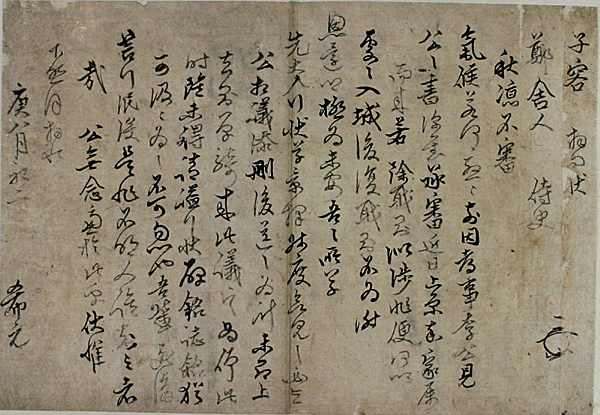Gim Jangsaeng on:
[Wikipedia]
[Google]
[Amazon]
 Kim Jang-saeng (; July 8, 1548 – August 3, 1631) was a
Kim Jang-saeng (; July 8, 1548 – August 3, 1631) was a
김장생, 한국의 문화인물
Kim Jang-saeng, Duke of Munwon
Kim Jang-saeng
1548 births 1631 deaths Neo-Confucian scholars Korean educators 17th-century Korean philosophers 17th-century Korean poets {{Korea-bio-stub
Neo-Confucian
Neo-Confucianism (, often shortened to ''lǐxué'' 理學, literally "School of Principle") is a Morality, moral, Ethics, ethical, and metaphysics, metaphysical Chinese philosophy influenced by Confucianism, which originated with Han Yu (768� ...
scholar, politician, educator, and writer of Korea's Joseon
Joseon ( ; ; also romanized as ''Chosun''), officially Great Joseon (), was a dynastic kingdom of Korea that existed for 505 years. It was founded by Taejo of Joseon in July 1392 and replaced by the Korean Empire in October 1897. The kingdom w ...
period.Jae-eun Kang The Land of Scholars: Two Thousand Years of Korean Confucianism 2006 "A pioneer of the study on family rites based on the doctrines of Zhu Xi in Joseon was Jim Jangsaeng (金長生, pen name is Sagye 沙溪, 1548–1631), who wrote Garye jimnam (家禮輯覽, Exposition of Family Rites) and belonged to the Giho ..."
He was the successor to the Neo-Confucian
Neo-Confucianism (, often shortened to ''lǐxué'' 理學, literally "School of Principle") is a Morality, moral, Ethics, ethical, and metaphysics, metaphysical Chinese philosophy influenced by Confucianism, which originated with Han Yu (768� ...
academic tradition of Yulgok Yi I
Yi I (; 1536–1584) was a Korean philosopher, writer, and Confucian scholar of the Joseon period. Yi is often referred to by his art name Yulgok ("Chestnut valley"). He was also a politicianSeong Hon
Seong Hon (; 25 June 1535 – 6 June 1598) was a Korean philosopher, poet, and politician during the Joseon
Joseon ( ; ; also romanized as ''Chosun''), officially Great Joseon (), was a dynastic kingdom of Korea that existed for 505 years. ...
().
Family
* Father ** Kim Gye-hwi (; 1526–1582) * Mother ** Lady Shin of thePyeongsan Shin clan
The Pyongsan Shin clan () is a clan of the Shin family, originating from Korea. The founding member of the clan participated in the foundation of the Goryeo dynasty and gained its power during this time. The founder was bestowed this last name ...
(; 1533–1618)
* Siblings
** Younger sister - Lady Kim of the Gwangsan Kim clan ()
** Younger half-brother - Kim Ui-sun ()
** Younger half-brother - Kim Yeon-sun ()
** Younger half-brother - Kim Gyeong-sun ()
** Younger half-brother - Kim Pyeong-sun ()
** Younger half-sister - Lady Kim of the Gwangsan Kim clan ()
** Younger half-sister - Lady Kim of the Gwangsan Kim clan (); Kim Sang-yong’s second wife
* Wives and their children
** Lady Jo of the Changnyeong Jo clan (; 1551–1586)
*** Son - Kim Eun ()
*** Son - Kim Jib (; 1574–1656)
*** Son - Kim Ban ()
** Lady Kim of the Suncheon Kim clan ()
** Unnamed concubine
*** 4 unnamed children
See also
*Gwangsan Kim clan
The Gwangsan Kim clan () is a Korean clan with its bon-gwan located in Gwangsan, present-day Gwangju.
The members of the Gwangsan Kim clan are the descendants of Kim Hŭng-gwang (), the third son of Sinmu of Silla, King Sinmu of Silla, the 45th ...
* Kim Jip
Kim Jip (; 1574–1656) was a Korean Neo-Confucian scholar, politician, educator and writer of the Joseon period. He was also the teacher of Song Si-yeol and Song Jun-gil, great Korean Neo-Confucian scholars.
Family
* Father
** Kim Jang-saeng ...
* Queen Ingyeong
Queen Ingyeong (; 25 October 1661 − 16 December 1680), of the Gwangsan Kim clan, was a posthumous name bestowed to the wife and first queen consort of Yi Sun, King Sukjong, the 19th Joseon monarch. She was queen consort of Joseon from 1674 u ...
* Kim Manjung
* Kim Ik-hun
Kim Ik-hun (, 1619 – March 11, 1689) was a Korean politician, a general, and part of the noble class during the Joseon period. His art name was Gwangnam () and his courtesy name was Mu-suk ().
Biography
Kim Ik-hun was born in 1619. He was t ...
* Song Jun-gil
Song Chun-gil (; 28 December 1606 – 2 December 1672), also known by his art name Tongch'undang, was a Korean politician and Neo-Confucian scholar, who lived during the Joseon period.
Born in Okcheon, North Chungcheong Province, he was the be ...
* Song Si-yeol
A song is a musical composition performed by the human voice. The voice often carries the melody (a series of distinct and fixed pitches) using patterns of sound and silence. Songs have a structure, such as the common ABA form, and are usuall ...
* Yun Hyu
Yun Hyu (; 1617–1680) was a Korean Neo-Confucian scholar and official, who lived during the Joseon period. Yun was the political leader of the Southern (''Namin'') faction of the Joseon Dynasty. His pen names were Paekho, Hahŏn and Yapo.
...
* Yun Jeung
Yun Jeung or Yun Chŭng (1629 – 30 January 1714) was a Confucian scholar in Korea during the late period of the Joseon dynasty. He was known as being a progressive thinker and for his opposition to the formalism and ritualism in the predominant ...
*Queen Inseon
Queen Inseon (; 30 January 1619 – 20 March 1674), of the Deoksu Jang clan, was a posthumous name bestowed to the wife and queen consort of Yi Ho, King Hyojong. She was queen consort of Joseon from 1649 until her husband's death in 1659, after ...
References
External links
김장생, 한국의 문화인물
Kim Jang-saeng, Duke of Munwon
Kim Jang-saeng
1548 births 1631 deaths Neo-Confucian scholars Korean educators 17th-century Korean philosophers 17th-century Korean poets {{Korea-bio-stub